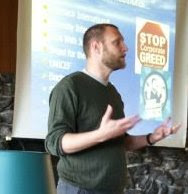Luke 19:28-40 (esp. vv 30-31)
No wonder the pharisees ask Jesus to tell the people to stop--what the people are doing is treasonous! Jesus is riding into Jerusalem like a king, and the people are singing hymns to him that describe him as a king. Jerusalem is already a tinder-box with thousands of people crammed inside the walls for the feast days, and there are likely hundreds of rabble-rousers and revolutionaries about trying to foment resistance and a take-over of power. Here comes Jesus in a veritable parade! Any of us would have done the same, and asked Jesus to quiet down the crowds before the soldiers come and someone gets seriously hurt. How insensitive Jesus must have seemed to those religious and social leaders, showing such disregard for the safety of the people and the holiness of the season.
And what are we to think of Jesus' charge to take ("borrow" isn't supported by the text) a colt without paying for it, with just the explanation: "The Lord needs it"? Would any of us allow our car to be taken by strangers with just such a plea? (We are apt to argue that there are charlatans that abuse such language and trust today, but are we to believe that there were no false-prophets, no profiteers, no one willing to take advantage of such trust and faith-claims then as there are now? We cannot let ourselves off the hook because of our jaded experience--I'm certain the first-century residents of Palestine, and even more so the residents of Jerusalem, were familiar with the abuses done in the name of God.) And then, if the people did somehow believe that the colt was to be used for God, they would object to this colt precisely because it had never been ridden before, it was unbroken, still virtually untamed. To try to ride it would be impossible--it would be uncontrollable and end up hurting the rider and everyone around! The owners of the unbroken colt would have offered another, more obedient servant for the Lord's work.
Every element of the story seems fanciful, impossible... but we must remember that this story isn't primarily a factual account, but a faith-building story: a telling that shapes our faith and understanding as it goes, and so the description of Jesus' entrance into Jerusalem is instructive for the reader, you and me.
What is the significance of Jesus' request to ride on a colt that has never been ridden on before? Is this a Lucan reference to the uniqueness of Jesus? A symbol of the untried message or means of Jesus? Lucan confirmation of the newness of the revelation brought by Jesus? What is distinctly Jesus in Luke?
Jesus calls for a radical transformation of society through the active subversion of oppressive structures (both mental/spiritual and political/physical) and through the substitution of new (Zionic) relations, grounded in a vision supplied by faith in a loving and forgiving and earnest God. To attempt a revolution of social, spiritual, and political dynamics without the use of force is an remarkably bold and untried program. Active nonviolent resistance that edifies both parties in conflict while establishing just relations is like an unbroken colt--impossible to manage or direct, impossible to control, and more than likely going to kick off any rider than be put to such direction.
OR, perhaps the world is symbolized by the colt: the assumption is that people need to be trained to obey before they can be managed, and that obedience comes from shows of power and strength, an understanding of position in hierarchy. In short, horses are broken through violence, and it is only after they are broken that they become valuable or useful in the eyes of the world. Jesus, however, asks for unbridled, unbroken people; Jesus asks for the wild strength and natural equality felt by an unbroken colt. And Jesus is somehow able (in a way that probably none of us could do) to mount and direct the colt for the Lord's work. This brings more force to Jesus' call to set the captives free--I'm sure he was talking about many of the people actually behind bars, but he was also talking about the broken people, those obedient to the masters of the world. This also brings more force to the people's cries of Jesus as king--defying the political king and the power of Rome.
We are called to Jesus for the Lord's work--though we think we are unfit, unworthy, unmanageable, that others are better suited. And we are called not as slaves, obedient to position and power, but as maverick spirits, and unbroken colts. God wants our natural sense of equality and justice, our sense of our own power and ability to resist domination; to put ourselves under the direction of Jesus, to recognize only one king (on earth as it is in heaven), to adopt Jesus' struggle and means of struggling. We are to continue the walk Jesus started on his way into Jerusalem: the conversion of the world through active nonviolent loving resistance (ahisma?) and substitution of a new world, a new way of thinking, Zion.
But that also means we have to give up the bridle and the bit (and the blinders and the saddle). We have to give up our addiction to control, to position, to direction, to domination (even sometimes over ourselves). We have to venture out of the stable, allow ourselves to be led away without assurance that we will ever return, simply at the call of the need of the Lord.
Labels: Luke, Midrash, Peace, Way of the Cross (Discipleship)


